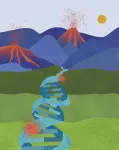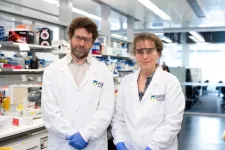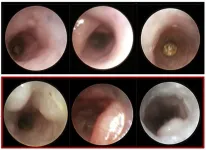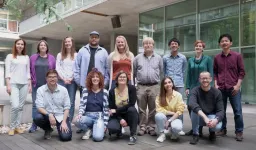(Press-News.org) Correct and incorrect recommendations inter-mingled in one-third of the chatbot’s responses, making errors more difficult to detect
For many patients, the internet serves as a powerful tool for self-education on medical topics. With ChatGPT now at patients’ fingertips, researchers from Brigham and Women’s Hospital, a founding member of the Mass General Brigham healthcare system, assessed how consistently the artificial intelligence chatbot provides recommendations for cancer treatment that align with National Comprehensive Cancer Network (NCCN) guidelines. Their findings, published in JAMA Oncology, show that in approximately one-third of cases, ChatGPT 3.5 provided an inappropriate (“non-concordant”) recommendation, highlighting the need for awareness of the technology’s limitations.
“Patients should feel empowered to educate themselves about their medical conditions, but they should always discuss with a clinician, and resources on the Internet should not be consulted in isolation,” said corresponding author Danielle Bitterman, MD, of the Department of Radiation Oncology and the Artificial Intelligence in Medicine (AIM) Program of Mass General Brigham. “ChatGPT responses can sound a lot like a human and can be quite convincing. But, when it comes to clinical decision-making, there are so many subtleties for every patient’s unique situation. A right answer can be very nuanced, and not necessarily something ChatGPT or another large language model can provide.”
The emergence of artificial intelligence tools in health has been groundbreaking and has the potential to positively reshape the continuum of care. Mass General Brigham, as one of the nation’s top integrated academic health systems and largest innovation enterprises, is leading the way in conducting rigorous research on new and emerging technologies to inform the responsible incorporation of AI into care delivery, workforce support, and administrative processes.
Although medical decision-making can be influenced by many factors, Bitterman and colleagues chose to evaluate the extent to which ChatGPT’s recommendations aligned with the NCCN guidelines, which are used by physicians at institutions across the country. They focused on the three most common cancers (breast, prostate and lung cancer) and prompted ChatGPT to provide a treatment approach for each cancer based on the severity of the disease. In total, the researchers included 26 unique diagnosis descriptions and used four, slightly different prompts to ask ChatGPT to provide a treatment approach, generating a total of 104 prompts.
Nearly all responses (98 percent) included at least one treatment approach that agreed with NCCN guidelines. However, the researchers found that 34 percent of these responses also included one or more non-concordant recommendations, which were sometimes difficult to detect amidst otherwise sound guidance. A non-concordant treatment recommendation was defined as one that was only partially correct; for example, for a locally advanced breast cancer, a recommendation of surgery alone, without mention of another therapy modality. Notably, complete agreement in scoring only occurred in 62 percent of cases, underscoring both the complexity of the NCCN guidelines themselves and the extent to which ChatGPT’s output could be vague or difficult to interpret.
In 12.5 percent of cases, ChatGPT produced “hallucinations,” or a treatment recommendation entirely absent from NCCN guidelines. These included recommendations of novel therapies, or curative therapies for non-curative cancers. The authors emphasized that this form of misinformation can incorrectly set patients’ expectations about treatment and potentially impact the clinician-patient relationship.
Going forward, the researchers are exploring how well both patients and clinicians can distinguish between medical advice written by a clinician versus a large language model (LLM) like ChatGPT. They are also prompting ChatGPT with more detailed clinical cases to further evaluate its clinical knowledge.
The authors used GPT-3.5-turbo-0301, one of the largest models available at the time they conducted the study and the model class that is currently used in the open-access version of ChatGPT (a newer version, GPT-4, is only available with the paid subscription). They also used the 2021 NCCN guidelines, because GPT-3.5-turbo-0301 was developed using data up to September 2021. While results may vary if other LLMs and/or clinical guidelines are used, the researchers emphasize that many LLMs are similar in the way they are built and the limitations they possess.
“It is an open research question as to the extent LLMs provide consistent logical responses as oftentimes ‘hallucinations’ are observed,” said first author Shan Chen, MS, of the AIM Program. “Users are likely to seek answers from the LLMs to educate themselves on health-related topics---similarly to how Google searches have been used. At the same time, we need to raise awareness that LLMs are not the equivalent of trained medical professionals.”
Disclosures: Bitterman is the Associate Editor of Radiation Oncology, HemOnc.org and receives funding from the American Association for Cancer Research.
Funding: This study was supported by the Woods Foundation.
Paper cited: Chen, S, et al. “Use of Artificial Intelligence Chatbots for Cancer Treatment Information” JAMA Oncology DOI: 10.1001/jamaoncol.2023.2954
END
ChatGPT shows limited ability to recommend guidelines-based cancer treatments
Correct and incorrect recommendations inter-mingled in one-third of the chatbot’s responses, making errors more difficult to detect
2023-08-24
ELSE PRESS RELEASES FROM THIS DATE:
Topography of the genome influences where cancer mutations thrive, study shows
2023-08-24
Researchers at the University of California San Diego have uncovered a connection between the topography of the human genome and the presence of mutations in human cancer. They found that certain regions of the genome, which exhibit unique features, act as hotspots for the accumulation of mutations.
The findings, published recently in Cell Reports, shed light on how the 3D architecture of the human genome may play a role in the development of various forms of cancer.
The human genome is often visualized as the iconic DNA double helix, composed of long sequences of the letters A, C, G and T. “However, the genome ...
Pioneering treatment highly effective for rare kidney disease
2023-08-24
A pioneering drug for a rare kidney disease prevents organ failure and significantly improves the outcome for patients, new research has confirmed.
Atypical Haemolytic Uraemic Syndrome (aHUS) is a genetic life-threatening condition caused by a defect in the immune system which leads to kidney failure.
Newcastle University, UK, carried out clinical trials into the drug, eculizumab, which eventually led to the NHS approving the treatment for use in patients from 2015.
Now, a study by Newcastle experts, published in Blood, ...
Getting protein factories to run – How deubiquitinating enzymes moonlight as Fubi proteases
2023-08-24
Fubi is produced by cells as a fusion protein with the ribosomal protein S30, and must be separated from S30 by proteases for functioning ribosomes. In immune cells, this by-product of ribosome production is utilized as a secreted signalling molecule, for example to locally reduce the activity of the maternal immune system in the uterus and to thus enable embryos to implant. How Fubi is specifically recognized by proteases and how they distinguish it from ubiquitin was previously unknown.
First author Rachel O’Dea and Malte Gersch explain their research in detail:
What is the discovery that you made and why is it exciting?
Our team revealed ...
Eureka win for researchers behind new anti-cancer strategy
2023-08-24
Associate Professor Tim Thomas and Professor Anne Voss from WEHI (Melbourne, Australia) have been awarded the 2023 UNSW Eureka Prize for Scientific Research.
The prize recognises their groundbreaking research in developing a new class of drugs that can put cancer cells ‘to sleep’ without triggering the harmful side effects caused by conventional cancer treatments, like chemotherapy and radiation.
The Australian Museum Eureka Prizes are among Australia’s most distinguished science awards, honouring excellence across the areas of research and innovation, leadership, science engagement, and school science.
At a glance
Associate Professor Tim Thomas and Professor ...
Cattle farming expansion and unchecked climate change would expose more than 1 billion cows to heat stress
2023-08-24
More than 1 billion cows around the world will experience heat stress by the end of the century if carbon emissions are high and environmental protection is low, according to new research published today in IOP Publishing’s journal Environmental Research Letters.
This would mean cattle farming would face potentially lethal heat stress in much of the world, including Central America, tropical South America, Equatorial Africa, and South and Southeast Asia. The research also found that rapidly reducing greenhouse gas emissions, as well as keeping cattle production close to current levels, would reduce these impacts by at least 50% in Asia, 63% in South America, and ...
Bees from the time of the pharaohs found mummified on the Southwest Coast of Portugal
2023-08-24
A new study reports the discovery of hundreds of mummified bees inside their cocoons. These cocoons, produced almost three thousand years ago, were discovered in a new paleontological site discovered on the coast of Odemira, in Portugal.
About 2975 years ago, Pharaoh Siamun reigned in Lower Egypt; in China the Zhou Dynasty elapsed; Solomon was to succeed David on the throne of Israel; in the territory that is now Portugal, the tribes were heading towards the end of the Bronze Age. In particular, on the southwest coast of Portugal, where is now Odemira, something strange and rare ...
Study IDs secret of stealthy invader essential to ruinous rice disease
2023-08-24
The virulence of a rice-wrecking fungus — and deployment of ninja-like proteins that help it escape detection by muffling an immune system’s alarm bells — relies on genetic decoding quirks that could prove central to stopping it, says research from the University of Nebraska–Lincoln.
A Nebraska team helmed by Richard Wilson hopes that identifying an essential but formerly unknown stage in the fungal takeover of rice cells can accelerate the treatment or prevention of rice blast disease, which ruins up to 30% of global yields each year.
“The response I’ve gotten from people in my field is that they’re very excited, ...
Mutations in blood stem cells can exacerbate colon cancer
2023-08-24
Researchers at the University of Florida College of Medicine have discovered how common age-related changes in the blood system can make certain colon cancers grow faster. The study, to be published August 24 in the Journal of Experimental Medicine (JEM), also suggests how these effects might be therapeutically targeted to reduce tumor growth and improve patient survival.
As we age, the hematopoietic stem cells that reside in the bone marrow and give rise to all of the body’s different blood cells gradually acquire mutations in their ...
The ‘treadmill conveyor belt’ ensuring proper cell division
2023-08-24
Researchers at the Centre for Genomic Regulation (CRG) have discovered how proteins work in tandem to regulate ‘treadmilling’, a mechanism used by the network of microtubules inside cells to ensure proper cell division. The findings are published today in the Journal of Cell Biology.
Microtubules are long tubes made of proteins that serve as infrastructure to connect different regions inside of a cell. Microtubules are also critical for cell division, where they are key components of the spindle, the structure which attaches itself to chromosomes and pulls them apart into each new cell.
For the spindle to function properly, cells rely on microtubules to ‘treadmill’. ...
Significant progress in cell separation technology made by Griffith University team
2023-08-24
Early detection allows for timely intervention in many diseases before they progress to a severe stage, often at a lower treatment cost. This is particularly crucial in the case of cancer, as the stage of cancer development at the time of initial diagnosis significantly influences the patient's prognosis and survival rate. Therefore, regular medical check-ups can ensure better survival and quality of life. However, the multitude of medical examination items makes the experience both loved and loathed. With various ...
LAST 30 PRESS RELEASES:
Hairdressers could be a secret weapon in tackling climate change, new research finds
Genetic risk for mental illness is far less disorder-specific than clinicians have assumed, massive Swedish study reveals
A therapeutic target that would curb the spread of coronaviruses has been identified
Modern twist on wildfire management methods found also to have a bonus feature that protects water supplies
AI enables defect-aware prediction of metal 3D-printed part quality
Miniscule fossil discovery reveals fresh clues into the evolution of the earliest-known relative of all primates
World Water Day 2026: Applied Microbiology International to hold Gender Equality and Water webinar
The unprecedented transformation in energy: The Third Energy Revolution toward carbon neutrality
Building on the far side: AI analysis suggests sturdier foundation for future lunar bases
Far-field superresolution imaging via k-space superoscillation
10 Years, 70% shift: Wastewater upgrades quietly transform river microbiomes
Why does chronic back pain make everyday sounds feel harsher? Brain imaging study points to a treatable cause
Video messaging effectiveness depends on quality of streaming experience, research shows
Introducing the “bloom” cycle, or why plants are not stupid
The Lancet Oncology: Breast cancer remains the most common cancer among women worldwide, with annual cases expected to reach over 3.5 million by 2050
Improve education and transitional support for autistic people to prevent death by suicide, say experts
GLP-1 drugs like Ozempic could cut risk of major heart complications after heart attack, study finds
Study finds Earth may have twice as many vertebrate species as previously thought
NYU Langone orthopedic surgeons present latest clinical findings and research at AAOS 2026
New journal highlights how artificial intelligence can help solve global environmental crises
Study identifies three diverging global AI pathways shaping the future of technology and governance
Machine learning advances non targeted detection of environmental pollutants
ACP advises all adults 75 or older get a protein subunit RSV vaccine
New study finds earliest evidence of big land predators hunting plant-eaters
Newer groundwater associated with higher risk of Parkinson’s disease
New study identifies growth hormone receptor as possible target to improve lung cancer treatment
Routine helps children adjust to school, but harsh parenting may undo benefits
IEEE honors Pitt’s Fang Peng with medal in power engineering
SwRI and the NPSS Consortium release new version of NPSS® software with improved functionality
Study identifies molecular cause of taste loss after COVID
[Press-News.org] ChatGPT shows limited ability to recommend guidelines-based cancer treatmentsCorrect and incorrect recommendations inter-mingled in one-third of the chatbot’s responses, making errors more difficult to detect








